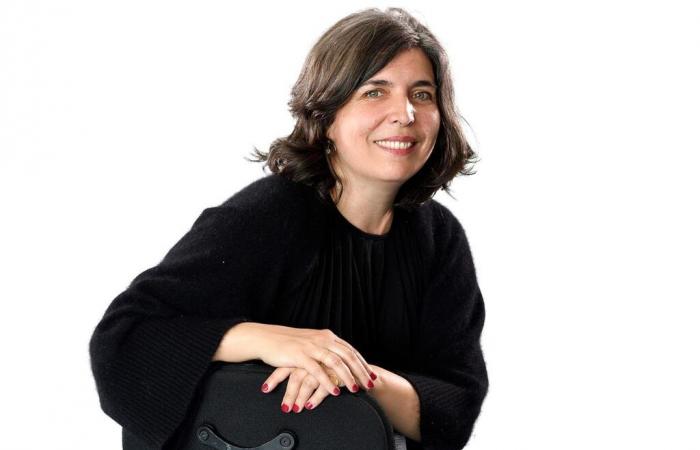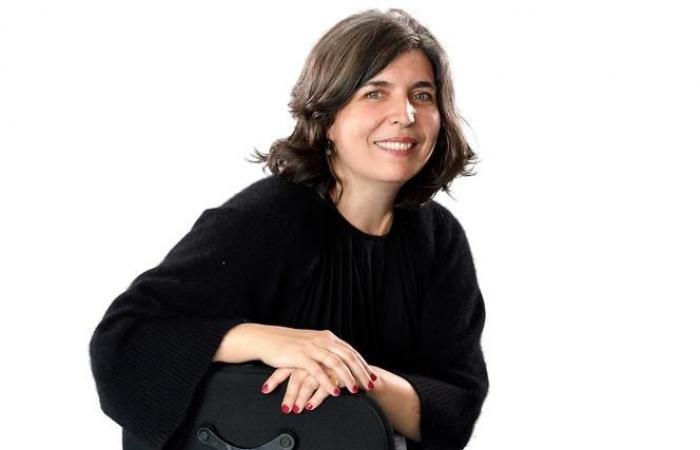FRANCE MUSIQUE – SUNDAY NOVEMBER 24 AT 11 AM – BROADCAST
Elegant and welcoming, Priscille Lafitte is the image of “Musique émoi”, a musical portrait of a personality from the arts or sciences, which brings together more than 210,000 listeners every Sunday on France Musique. A program previously produced by Elsa Boublil, received as “a gift” in September 2020, and that with her director Claire Lagarde, replaced today by Françoise Cordey, and Maud Noury, production assistant, she knows how to share so well.
With a warm voice, Priscille Lafitte accompanies her guests, suggests ideas and, she says, the music does the rest: “It’s she who moves the thinking forward, it’s she who does the “work”! And the intelligence, the presence of mind, the generosity of the guest goes all the way. »
Among the latest broadcasts, we think of the one where the actress Catherine Hiegel, with tears on the verge of tears, said: “Dad’s music and voice are the same thing. » It is not uncommon for the producer to keep a pack of tissues within microphone range. It's also not uncommon for the show to resemble a psychoanalysis session. “It is perhaps not for nothing that I let a good part of the architecture of the show be built along the way, happen, as if by free association… The questionnaire sent in advance to the guests already has this function : seek to open “drawers” of memories”confides Priscille Lafitte, before adding: “My analytical skills, however, stop there; and the analysand-analysed relationship is not between the interviewer-the interviewed, but between the guest and the music: it is indeed the music which is the object of the transfer, we add many of our own emotions to it , our projections, our fantasies, and our stories. »
“A form of communion”
She herself has an intimate, familial relationship with music. His mother, who directed a choir, played Bach and Chopin for him on the piano, his sister is a professional violinist. After studying journalism, Priscille Lafitte chose radio. His references? “The insurmountable Claude Maupome [disparue en 2006] and his “Egoist Concert” then “How do you hear it?” And also Laure Adler for her presence at the microphone; Augustin Trapenard as an outstanding maieutician of thought; Rebecca Manzoni for the sense of writing and rhythm in radio. »
Among her list of notable guests, she cites the authors Hélène Cixous and Amélie Nothomb, Alexander Neef, the current director of the Paris Opera, and the sociologist Edgar Morin. This one also with the actor Didier Sandre, member of the Comédie-Française: “Is this his relationship to Bach [il manque très rarement à l’appel de tous ces entretiens tant Bach est un socle très important de nos psychés musicales] or its relationship to the sacred in theater as in music, which resonated with me? I admit that I too grew up in a Protestant culture which perhaps explains a pronounced taste not only for Bach, for singing, but also for the search for a form of communion, a way of creating society around/through music, and this conviction that we are all equal in this relationship to the “sacred” that music contains/enables. Patrick Boucheron speaks very well of this need for “reconciliation” in society, particularly through music: I am very sensitive to it! »
“In a wild way”
This is good. The historian and professor at the Collège de France, producer since this year of “Let’s go see!” », Sunday from 2 p.m. to 3 p.m. on France Culture, is today's guest. Who immediately admits: « I'm not a specialist in classical music: it wasn't my first discotheque. It came in a wild, abrupt, disorderly way. » He evokes his participation in the writing of the ceremonies of the Olympic and Paralympic Games during which he was heard “all the diversity of French music”.
And too bad if this part could not, ultimately, be kept in the editing, he will also have said this, he, the historian with such a fine ear, he, the one attentive to the upheavals of the world: that we we sometimes “the right to rest and beauty. The right, and perhaps the duty, particularly at Radio France, to give thought a rest and not to let ourselves be systematically carried away by the flow of events”. While theStudy No. 6 by Philip Glass is heard, under the fingers of Vikingur Olafsson, his words, long after crossing the Seine, still resonate: emotion.
“Musique émoi”, a program by Priscille Lafitte. Available on France Musique and all the usual listening platforms (Fr., 2024, 58 min).







